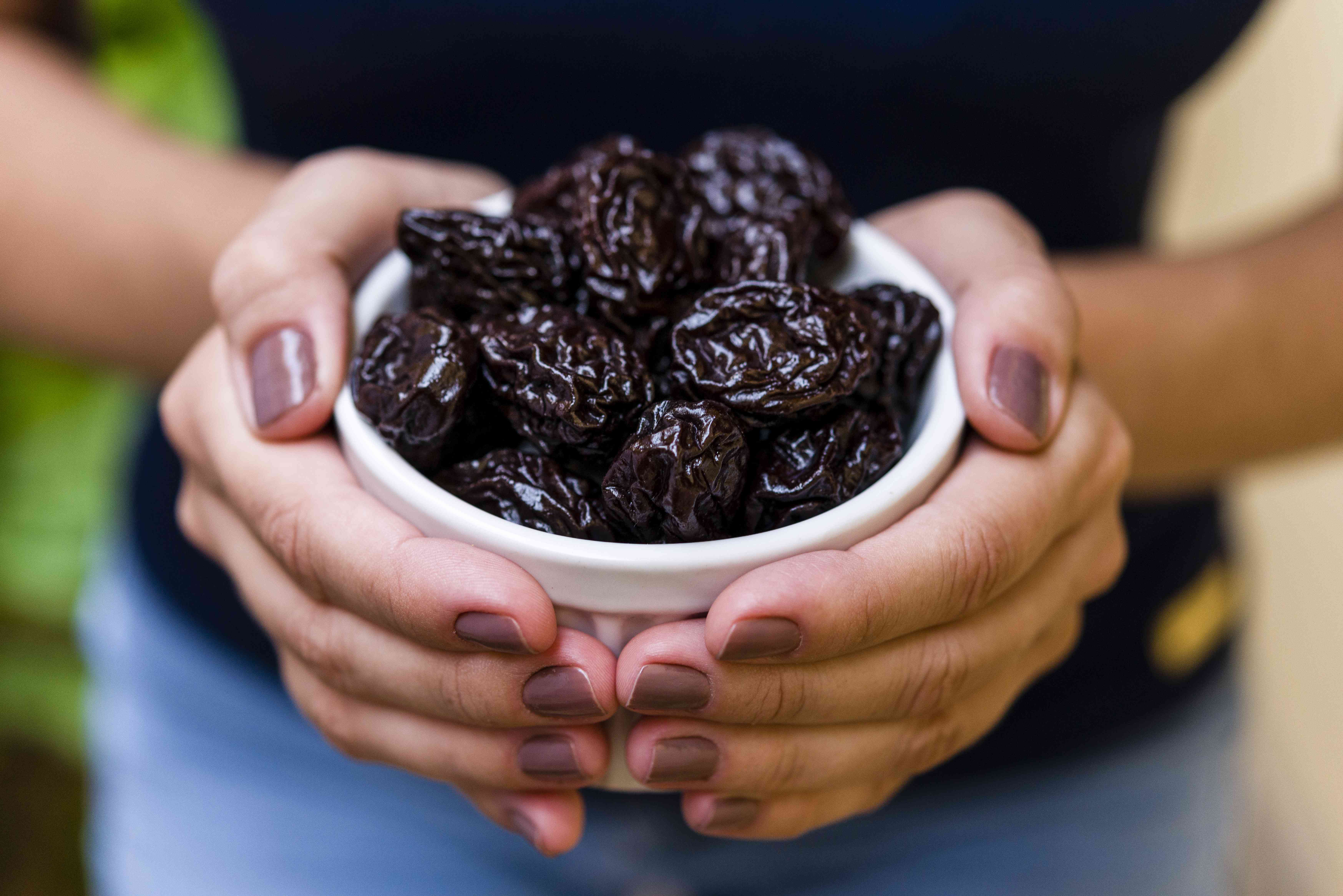Eating This Fruit Each Day Could Help Preserve Your Bone Health

A study on postmenopausal women found that daily prune intake could lower inflammatory markers linked to osteoporosis
- In a recent 12-month study, postmenopausal women who ate about five to 12 prunes daily had lower markers of inflammation related to osteoporosis than those who ate no prunes.
- The minerals and other nutrients in prunes may be the key to their effects on bone health.
- Prunes make a great snack alone or can be combined with other foods for a pop of sweetness.
It’s well established that prunes can aid in digestion, but recent research has revealed that the dried plums might offer another benefit: strengthening bones.
A study published in The Journal of Nutrition found that eating just a handful of prunes daily may reduce inflammatory markers related to bone loss in postmenopausal women.
The authors said the new research—part of the Prune Study, a broader investigation into the health benefits of prunes—suggests that prunes could provide a natural alternative to staving off osteoporosis, a condition that causes weak bones to break easily.
About 11 million people in the United States have osteoporosis, with about two-thirds being postmenopausal women. Women in this group are especially vulnerable to developing osteoporosis because they produce less estrogen, which protects bone mass.
Previous research has found a connection between prunes and improved bone health, but researchers said the new study was the largest to date examining this relationship.
Here’s what else you need to know about the research, as well as other ways prunes may affect health and how you can incorporate the dried fruit into your diet.

Julio Ricco / Getty Images
Measuring How Prunes Affect Bone Health
For the study, scientists recruited 183 women aged 55 to 75. They instructed some to consume 50 grams—roughly five or six prunes—daily and others to eat double that amount each day. A third group didn’t consume any prunes.
The team collected blood samples at the beginning of the study and its 12-month endpoint.
To assess how prune consumption may have affected bone health, the researchers analyzed the participants’ levels of pro-inflammatory cytokines. The proteins’ presence signals inflammation in the body.
“Chronic inflammation underlies numerous chronic diseases, including osteoporosis,” Connie J. Rogers, PhD, head of the Department of Nutritional Sciences at the University of Georgia, told Health.
The team found that, compared to people who ate no prunes, women who consumed either 50 or 100 grams of prunes daily had reduced levels of pro-inflammatory cytokines after a year. That’s an indication that the prune-eating women likely also enhanced their bone health, Rogers said.
She acknowledged, however, that the findings may not apply to a broad population because the participants were predominantly white, menopausal women. “Additional studies in a more diverse population are needed to ensure that the findings we observed are observed in a more heterogeneous population,” Rogers said.
Another limitation was that the study was funded by the California Prune Board, which represents prune growers and handlers. However, the researchers noted that the organization had no role in the study’s design, analysis, interpretation, or writing.
According to Leslie Bonci, MPH, RD, a spokesperson for the California Prune Board, prunes contain many nutrients that could account for their possible bone-boosting effects.
“The vitamin K in prunes helps transport calcium to the bones,” she told Health. “Potassium and magnesium help with bone density, boron helps prevent calcium loss and the demineralization of bones, and the plant nutrients help to prevent oxidative damage to bone cells.”
How Else Might Prune Consumption Affect Health?
People have long turned to prunes as a natural remedy for constipation—a treatment that research supports. For example, one review found that increased prune consumption improved stool frequency and consistency in people with constipation.
On the flip side, prunes have been known to cause abdominal pain or diarrhea for some people—though Bonci said that gastrointestinal issues didn’t appear to be an issue for the participants in the bone loss study.
Other research has revealed that eating more prunes may improve heart health measures. A study presented at the American Society of Nutrition’s 2023 annual meeting, for instance, linked long-term prune consumption among men with better HDL (“good” cholesterol) and total cholesterol, as well as lower oxidative stress and decreased levels of the inflammatory biomarker C-reactive protein.
How to Include More Prunes in Your Diet
Prunes are sweet and bite-size, making them ideal to nosh on alone as a snack. But they can also add chewy texture and a burst of sweetness to other dishes as well.
Here are some of Bonci’s suggestions for “pruning” your diet:
- Puree prunes and use them as a fat and sugar replacement in baked goods
- Use prunes to naturally sweeten salad dressings, marinades, or barbeque or teriyaki sauce
- Sprinkle prune pieces atop salads or vegetable dishes like roasted broccoli or Brussels sprouts
- Use prunes in your morning oatmeal, yogurt, cereal, or smoothie
- Mix them with nuts, seeds, and dark chocolate for a trail mix
- Include them in homemade energy bites or granola bars
If you’re concerned about prunes’ digestive effects, Bonci recommends starting with just two prunes a day. “Then you can ramp up the amount gradually as your body adjusts,” she said.
This story originally appeared on: Health News - Author:Sarah Garone, NDTR


















